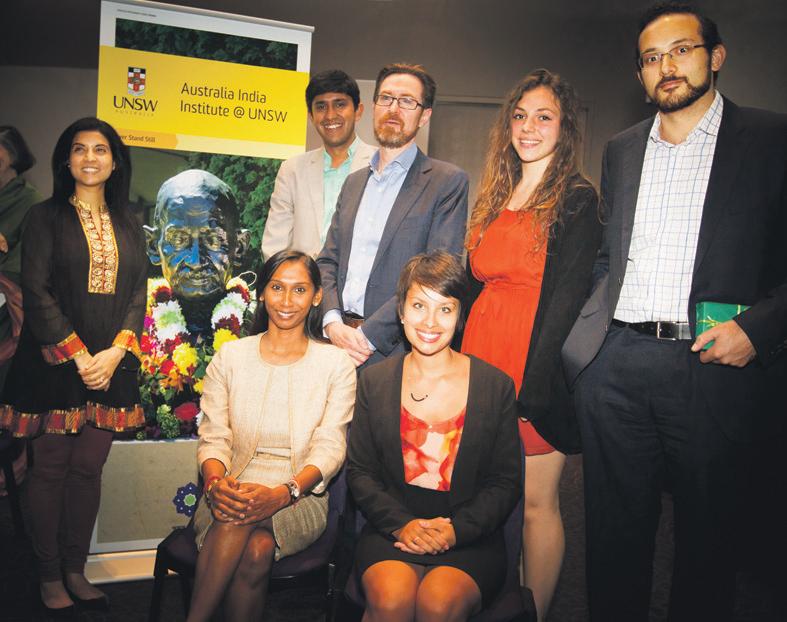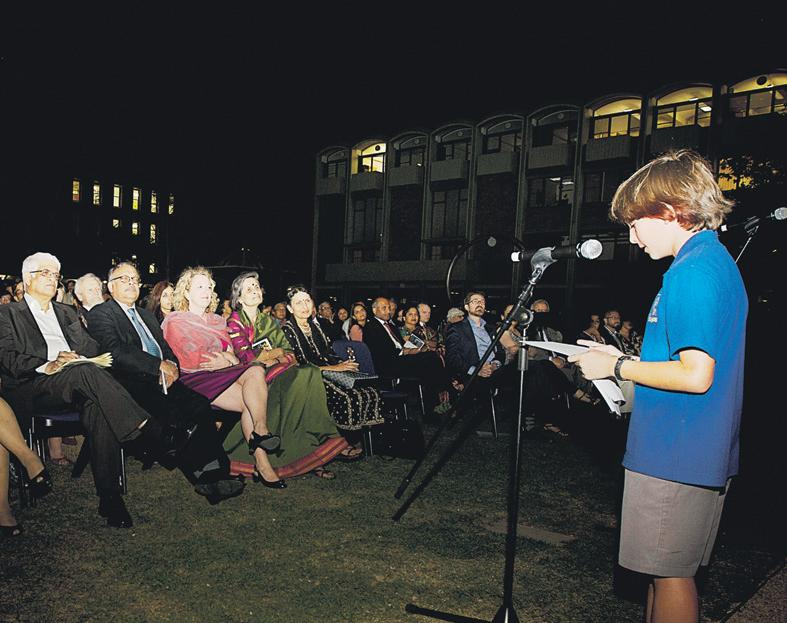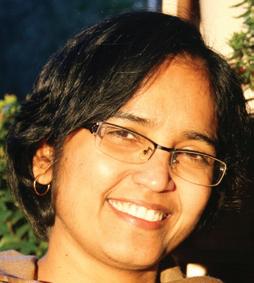
5 minute read
What gandhi means to young people today
from 2013-10 Sydney (2)
by Indian Link
BY JYOTI sHANkAR
Every year, October 2 is celebrated as Mahatma Gandhi’s birthday. In India, it is one of the three national holidays, along with the Republic Day and Independence Day. Since 2010, this day is similarily as important in the calendar of events of the Sydney node of the Australia India Institute (AII). This event, and the Gandhi Oration on the occasion of the Mahatma’s death anniversary (January 30, Martyr’s Day) are well-received events at the University of New South Wales (UNSW).
The violent attacks on Indian students in 2009 was a sad chapter in the history of AustralianIndian relations. It was in 2010 that the then Consul-General Amit Dasgupta, presented a bust of Mahatma Gandhi to UNSW as a gift from the people and the government of India, as an acknowledgement of the University’s connection with India and its provision of a safe environment for Indian students.

Gandhi has always been a symbol of non-violence and has been an inspiration to many world leaders such as Nelson Mandela (whose bust now stands on the same lawn as Gandhi at UNSW), Martin Luther King, Aung San Suu Kyi, Barack Obama and Albert Einstein. Said Neville Roach AO, patron of the AII and MC of the remembrance ceremony, “Gandhi values such as satya (truth), ahimsa (non-violence), sarvodaya (universal upliftment) and swaraj (self-rule).
“There are many causes that I am prepared to die for but no causes that I am prepared to kill for,” said Gandhi. Usha Sridhar and Heather Lee Cunio sang his favourite hymns to mark the occasion,
Raghupati Raghav Raja Ram and Lead Kindly Light she said. Danielle was honest in saying that though she could see Gandhi’s philosophy underpinning environmental and secular movements, they do not resonate very deeply in Australia.
That Gandhi continues to inspire even the younger generations was evident in Gianluca Santoro’s words. The young student from Ashbury Public School, gave a moving speech on how he was inspired by Ela Gandhi’s visit last year to learn more about Gandhi and his teachings. The panel session later in the evening, on the topic, ‘What Gandhi means to young Indians and Australians today’ shed some more light on this. Moderated by Rory Medcalf, Associate Director of the AII, this session had six young people sharing Gandhi’s influence on them personally, and reflecting on his impact on the world.
Dr Monika Barthwal-Datta, a lecturer at UNSW and a member of the Australia India Youth Dialogue (AIYD), felt that “Gandhian principles of social justice and self-reliance are very relevant in this age of globalisation, where achieving food security and sustainability are proving to be increasingly difficult”.
Ruchir Punjabi, Chair of the AIYD, was concerned at frequent use of the Mahatma’s words as political rhetoric in India today. “As a former resident of Ahmedabad where Gandhi spent many years of his life, when I was younger, my peers and I often discussed the person who was Gandhi, rather than the icon the world has made him,” he stated.
Said Ayshe Sahinovic, a student of Fort Street High School, “Though presently we do not face struggles of the magnitude that Gandhi faced, his non-violent approach to life, and belief in the respect and dignity for others, has certainly shaped my attitude about how to respond to my own smaller challenges and to the actions of others”.
Matthew Benjamin of the Australia India Internship Program too, has been similarly inspired. “Gandhi taught us what individuals can do to challenge the status quo. There will always be imperfections in the world but Mahatma Gandhi taught us to believe in the power of change, as he said: Be the change that you wish to see in the world,” he added.
Danielle Rajendram, research associate at the Lowy Institute, opined that Gandhian tactics such as fasting and satyagraha, was very much alive in today’s India, as observed recently in the anticorruption and sexual violence campaigns. “But it is true that politicians do continue to take advantage of his name. Gandhi is a recurrent theme in Narendra Modi’s speeches, his claim to Gandhi being that they were both born in the same state of Gujarat. And they wear homespun khadi.

Sanushka Seomangal, a South African-Australian, practising lawyer and secretary of the AIYD, had a personal connection to Gandhi. Her grandfather had to carry an obligatory identity document card commonly known as the ‘pass’ to live in South Africa, and had to pay an ex-indenture tax to grow their fruit and vegetables. Gandhi, who lived in South Africa during the time of her grandfather, taught Indians to respect themselves as Indians and feel proud of their identity, and not distinguish themselves by caste or religion. “The difference in being a migrant at the time of apartheid in South Africa that my grandfather experienced, and my privileged life as a migrant in Australia could not be more acute,” she said.
Questions about Gandhi’s role in the partition of India have been discussed time and again, and the issue came up here too. The panellists felt that it was not necessary to defer to everything that Gandhi said, but choose some of the universal values that he espoused. After all, he was a man of his times and situations are never the same. Can his methods work for the Middle East is a hypothetical question. As Mahatma Gandhi himself would have argued, everything is an experiment in truth.
Rory threw up an interesting question to the panel, if Gandhi was alive today, would he use social media? There was a consensus among the panel on this. The master of sound bites, Mohandas
Karamchand Gandhi aka ‘The Mahatma’, would definitely be very active on Twitter and would have an interesting Facebook page. His voice would have travelled further and inspired many more around the world. As Einstein said on the occasion of Gandhi’s 70th birth anniversary, “Generations to come, it may well be, will scarce believe that such a man as this one ever in flesh and blood walked upon this earth”.
For the youth of today, though the Indian freedom struggle seems like a distant memory, Gandhi’s aphorisms have lingered on. Few from the generation of people who lived and witnessed the times of pre-independence India, exist today. The present generation is detached from the baggage of their fathers and grandfathers who revered the man, who was a ‘Mahatma’, above criticism. The Mahatma was his own greatest critic and a simple man who did not like being revered. As Monika said, what he would have definitely been sad about would be the apathy of the youth, the lack of readiness to give up their comforts for the greater good, and the lack of collective responsibility today. So the values of Gandhi are still relevant today. As Jayaprakash Narayan, a close associate of Gandhi said, “If all these ideas and activities are viewed in isolation, they constitute a miscellaneous and rather archaic collection, the importance of which will dwindle and fade away with time. It is only when it is realised that Gandhi was fundamentally a moral and social philosopher and that, through these items, he sought to experiment with certain far-reaching fundamental principles, of whose absolute truth he was convinced beyond all doubt, that their true significance becomes clear”.










